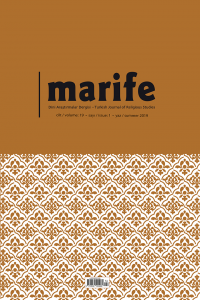
Marife Dini Araştırmalar Dergisi
Yazarlar: Bayram DEMİRCİGİL, Soner AKSOY
Konular:Din Bilimi
DOI:10.33420/marife.903003
Anahtar Kelimeler:Tafsir,Qur’ān,Khidr-Moses,Killing the Child,Justice
Özet: There is no doubt that the child being killed by Khidr in the story of Khidr and Moses in the Qur’ ān surah al-Kahf verses 60 to 82 has been one of the most fascinating and controversial issues and brought about some criticism in terms of the sense of justice. The topics related to this issue had been under discussion by kalam schools like Ash’arites, Mu’tazilites, and Maturidites during the early period of Islamic history. The question here is whether Allah considers the human perception of justice in His deeds and acts accordingly. It should be acknowledged that the comprehension of such an issue by modern mindset is not easy. The schools of thought had approached the matter either from the perspective of Allah’s will and omnipotence or in the light of justice or concerning the balance between wisdom and justice and made discussions in the light of these concepts. This issue had also been addressed by classical and modern exegetes and analyzed from different perspectives. In these statements, with some exceptions, the aspect related to the predestination and unseen world had been blended with the judicial dimension of the issue. Therefore, they generally concentrated on the age of the child and the grounds for his execution. This attitude has made the issue more complex rather and caused several debates and diverse opinions. It is an inaccurate judgment to limit the actions of Allah on His servants and the universe with a legal framework in line with human perception and understanding because the acts and deeds of Allah who has the sovereignty and knowledge of everything in the universe is the absolute expression of the truth. Thinking otherwise would mean ascribing deficiency to Allah. It is vital to realize that the time of recognition of the reason behind some actions of Allah is quite uncertain for humans. This fact has been emphasized in the Qur’ ān numerous times. Nevertheless, some authors maintained that the murder of the child by Khidr in the story would damage the sense of justice in human and overshadow the absolute justice of Allah. According to them, Allah has relations with humans as undetermined destiny within the boundaries of ethics. Despite this, they never saw the story of Abraham as a problematic matter when Allah ordered him to slaughter his son. They did not consider this case as an example of the relation between Allah and humanity. We should realize that these remarks do not comply with reality because some lessons could also be deduced from this story about the relations between Allah and human. We should acknowledge that the motive behind this approach is to focus excessively on the killing of the child by including this issue in the debates of kalam. As a result, the details which will help to understand the story as a whole have been neglected. On the otherhand, the key point to understand the matter in the narrative is the sentence used by Khidr when he warned Moses by saying in their meeting “You certainly cannot be patient with me. how can you be patient with what is beyond your knowledge?” and before they depart “I did not do it of my own accord”. So, through these remarks, Khidr indicated that Moses would face some incidents beyond human intellect and these would happen by the will of Allah. This essential message in the story was dismissed by some people who did not follow a holistic approach in this matter. Thus, the main misconception in dealing with the story is disregarding the fact that certain messages beyond human comprehension exist in the story of Khidr and Moses as was the case with the story of Abraham. Given these points, we will be analyzing the subject in a holistic approach without exceeding the limits of the language used in the story and discover the objectives behind the utterance of the story in the Qur’ ān. In this paper, we presented the views of scholars, evaluated traditional and modern approaches and, discussed the possibility of analyzing the problem in the context of sharia law and kalām. At this point, we assert that we aim by the words meaning and value to identify the basic message that the related topic includes and its functions for audience rather than referring to the philosophical aspect of the issue because it requires further studies. In this study, we have considered the boundaries of the Qur’ānic exegesis as well as taking kalām discussions into account.